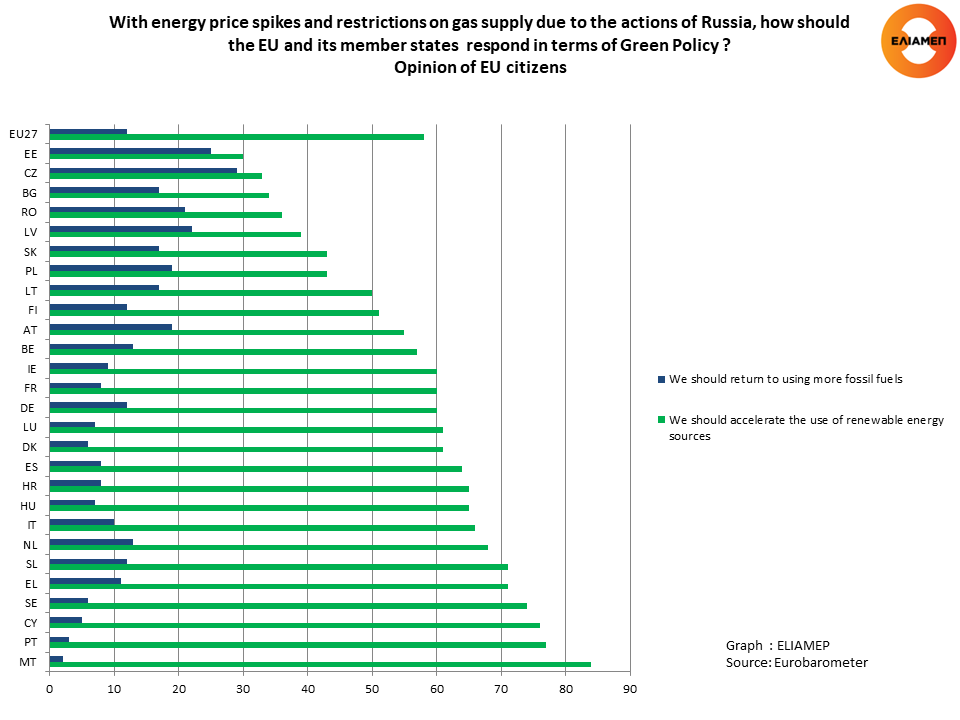With the European Green Deal in 2020, EU commits to cut greenhouse emissions by at least 55% compared to 1990 levels by the year 2030, and to net zero by 2050. Following Russia’s invasion of Ukraine, lignite-fired power plants were temporarily re-activated in several member states in order to secure energy supply. Today, the main challenge is to avoid dependence on fossil fuels, which would undermine the Green Deal and EU’s effort to fight climate change.
Despite initial fears, it seems that in Europe the “REPowerEU” Plan is working: fossil fuel production in the EU fell dramatically in the first half of 2023, down 17% (-86 TWh) compared to the same period in 2022 .The decline has been Europe-wide: in some countries (Austria, the Czech Republic, Denmark, Finland, Italy, Poland and Slovenia) fossil fuel production is at its lowest level in the 21st century.
Wind and solar power now account for over 30% of electricity generation in the EU, more than fossil fuels. In the first half of 2023, seventeen Member States produced energy from renewable sources at record levels, with Greece and Romania exceeding 50% of total energy production, and Denmark and Portugal 75%.
But what do European citizens think about this issue?
In a Special Eurobarometer survey carried out in all 27 Member States between 10 May and 5 June 2023, respondents were asked how should the EU and its Member States act on the energy issue. Should we return back to using more fossil fuels during the energy crisis? Or should we speed up the green transition?
Almost six in ten (58%) responded that they preferred the latter: to accelerate the use of renewable energy sources, increase energy efficiency, and speed up the transition to a green economy. In 20 Member States, more than 50% of citizens shared this view. The percentage of citizens was higher in Malta (84%), Portugal (77%), and Cyprus (76%). Greece’s rate was the fifth highest: 71% of respondents agreed with accelerating the use of renewable energy sources and speeding up the green transition.
In contrast, in Estonia (30%), the Czech Republic (33%) and Bulgaria (34%) the percentage of those in favor of accelerating the green transition was lower. Central and Eastern Europe has traditionally been heavily dependent on Russian natural gas. Also, renewable targets in the region are low, and most power (55 per cent) still comes from fossil fuels.
A smaller but significant percentage of Europeans think that the right choice to deal with the energy crisis is to return to using more fossil fuels, even if the transition to the green economy needs to be slowed down. In four countries at least one in five citizens supports this position: Czech Republic (29%), Estonia (25%), Latvia (22%), Romania (21%). In Greece, around one in ten (11%) are in favor of return to using to fossil fuels and slowing down the green transition, a percentage slightly lower than the European average (12%). In other countries (Malta, Portugal, Cyprus), the relative percentage does not exceed 5%. Respondent characteristics show that proponents of the shift to fossil fuels are more likely to be older, less educated, and with lower income.
Although the crisis has revealed that high dependence on fossil fuels can skyrocket energy prices, many Europeans still support their use. How can we interpret this paradox? One possible answer is that in many countries governments subsidized heavily energy bills and hid the problem by not allowing consumers to realize the rapid rise in prices.
The question remains: How can the cost of energy policy be fairly distributed in order to ensure the widest possible public support for the green transition? Successful policy design and effective policy communication are the key challenges for policy makers in EU and its Member States.




